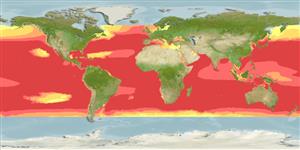Preferred temperature (Ref.
115969): 8.8 - 21.2, mean 15.1 (based on 784 cells).
Phylogenetic diversity index (Ref.
82804): PD
50 = 0.5039 [Uniqueness, from 0.5 = low to 2.0 = high].
Bayesian length-weight: a=0.01738 (0.01428 - 0.02115), b=3.01 (2.97 - 3.05), in cm Total Length, based on LWR estimates for this species (Ref.
93245).
Trophic level (Ref.
69278): 4.3 ±0.2 se; based on diet studies.
устойчивость к внешним воздействиям (Ref.
120179): средний (среднего размера), минимальное время удвоения популяции 1.4-4.4 года (K=0.13-0.18; tm=4-6; tmax=10; Fec=2 million).
Prior r = 0.43, 95% CL = 0.28 - 0.64, Based on 15 full stock assessments.
Fishing Vulnerability (Ref.
59153): High to very high vulnerability (71 of 100).
Climate Vulnerability (Ref.
125649): Moderate vulnerability (42 of 100).
